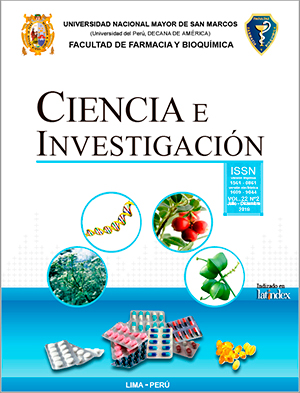Antiproliferative activity of the methanolic extract of piper aduncum leaves on gastric cancer cells
DOI:
https://doi.org/10.15381/ci.v22i2.17613Keywords:
Piper aduncum, Antiproliferative activity, gastric cancer, plant extractAbstract
The Piper aduncum, also known as “Matico” in Peru, is a plant used as a healing, anti-diarrheal, anti-inflammatory, anti-cancer and other traditional uses plus1; These effects have been demonstrated as the antimicrobial2 and cytotoxic effect, the latter using bioguided fractionation, observing the effect on leaf extracts with dichloromethane on KB cells (nasopharyngeal carcinoma)3 and the essential oil on lung carcinoma, colon adenocarcinomas, adenocarcinoma of breast, amelanotic melanoma, cervical carcinoma, prostate carcinomas, chronic myeloid leukemia and normal mouse fibroblasts; in addition to oral toxicity in mice, finding null and toxic antitumor effect4. In the present study, the in vitro antiproliferative activity of the methanolic extract of Piper aduncum leaves on the AGS cell line (gastric adenocarcinoma) acquired from the ECACC (European Authenticated Cell Culture Collection) was evaluated, using a colorimetric technique with the resazurine indicator, evaluating the results within 24 and 48 hours of having exposed the extract to different factors: 1000, 500, 250, 125, 62.5, 31, 15, and 7 ppm with cancer cells, to analyze the results the percentage of the difference in reduction between treated cells and control cells and from this data the percentage of growth inhibition was obtained. The IC50 was obtained at 24 hours with 131,5 ppm and at 48 hours with the IC50 it was 103,3 ppm, It can be evidenced that at 48 hours the effect becomes more potent having 100 % inhibition from 250 ppm of methanolic extract.
Downloads
Published
Issue
Section
License
Copyright (c) 2020 Víctor Miranda-García, Pablo Bonilla

This work is licensed under a Creative Commons Attribution-NonCommercial-ShareAlike 4.0 International License.
LOS AUTORES RETIENEN SUS DERECHOS:
- Los autores retienen sus derechos de marca y patente, y tambien sobre cualquier proceso o procedimiento descrito en el artículo.
- Los autores retienen el derecho de compartir, copiar, distribuir, ejecutar y comunicar públicamente el articulo publicado en la Revista Ciencia e Investigación (por ejemplo, colocarlo en un repositorio institucional o publicarlo en un libro), con un reconocimiento de su publicación inicial en la Revista Ciencia e Investigación.
- Los autores retienen el derecho a hacer una posterior publicación de su trabajo, de utilizar el artículo o cualquier parte de aquel (por ejemplo: una compilación de sus trabajos, notas para conferencias, tesis, o para un libro), siempre que indiquen la fuente de publicación (autores del trabajo, revista, volumen, numero y fecha).






